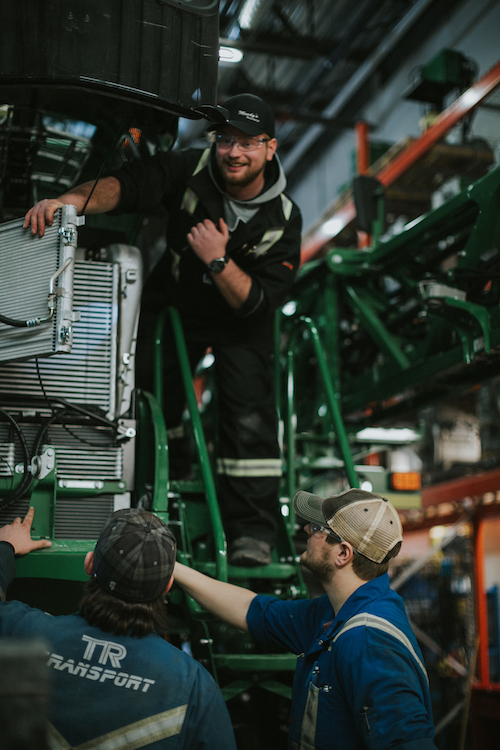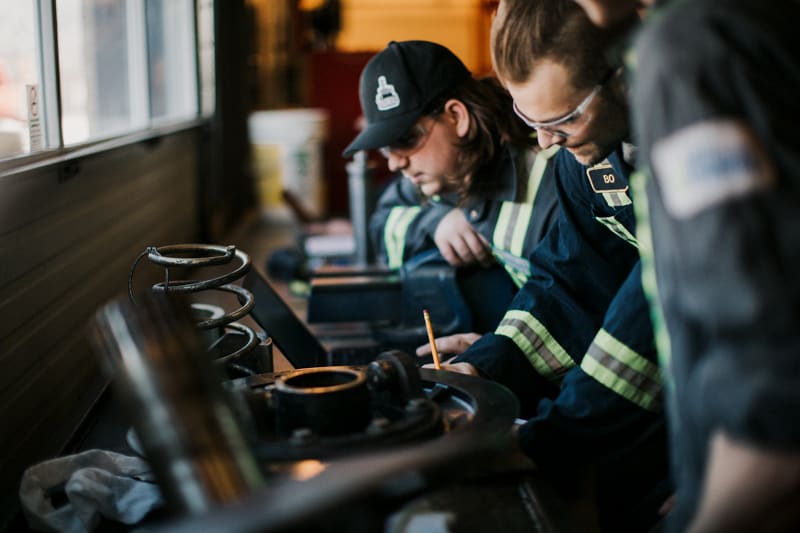Ag Equipment Technician Training Being Geared Toward High Schoolers
The Agricultural Equipment Technician program offered through the Sun West Distance Learning Centre has opened the door for high school students to get an understanding of the ag industry and potentially get an early start on careers as technicians.
Finding a good employee and keeping them on has become an increasingly difficult task for many farm equipment dealers. A good service technician is particularly hard to find. What seems to be a consensus among many dealers is younger people do not know enough or do not even consider entering the ag industry.
“Whether they were technicians in the agriculture industry or the trucking industry or the heavy equipment industry, there is becoming a worldwide shortage of technicians,” says Brent Bazin, corporate service manager at Young’s Equipment and board member of the Agricultural Equipment Trade Board for the Saskatchewan Apprenticeship and Trade Certification Commission (SATCC). “A technician today is not the technician we had 20 years ago. It is a lot more intense in terms of technology. Nowadays to get by in this trade you can pretty much be just as successful with anything offered at university. It becomes a matter of ‘Is this what I want to do for a career?’”
Over the last year, the Sun West Distance Learning Centre (DLC), in partnership with the Western Equipment Dealers Assn. (WEDA), Canada Equipment Dealers Foundation and Saskatchewan Polytechnic, have teamed up to form an education program to get younger kids interested in ag. In particular, this program, the Agricultural Equipment Technician (AET) program, has been designed with the goal of combating the shortage of ag techs across the industry by offering courses to high school students.
So far, the first year of the program has more than doubled the average enrollment Sun West DLC usually expects. Rather than the usual 20-30 students expected, the AET program saw over 100 enroll in the pilot year.
What is the AET Program?
Sun West DLC’s AET program is offered throughout the province of Saskatchewan to high school students. The program is an online elective for grades 11 and 12 and has three components: 50 hours of online theory covering numerous aspects of the ag tech position including safety guidelines and identifying precision measuring tools 40-hour work study in a local ag dealership 10 hour boot camp at the Saskatchewan Polytechnic campus
While the first component is entirely online, there is an actual instructor that students can communicate with as needed. It is important to note that this portion of the course was created in partnership with dealers which Bazin, who is an advisor for dealer needs with the program, believes is a large part of why the course has worked so far. The third component, the “boot camp,” allows students to combine what they learned in the first two components in a hands-on method while working with others who are already apprentices in the industry.
Students enrolled in AET receive high school credits but also can earn hours toward their apprenticeship certification. Completing the program makes the students eligible to apply for the Sask Youth Apprenticeship Program (SYA), an optional and free program that works in conjunction with AET. In order to become an apprentice and an ag tech, these students will need to complete the apprenticeship program at some point.
The intent is for the program to be rolled out for grades 10-12 in the future. It is currently running the 20-level course which is in its pilot year. The next phase, the 30-level course, is in development with the goal of being ready for fall enrollment. Starting the AET Program
The AET program started when members of the ag equipment industry approached Sun West DLC asking what could be done to expose more kids to opportunities in the industry. When they started working on the development of the program, the shortage in ag equipment techs was a critical issue.
“Larry Hertz (WEDA Regional Vice President of Canada) had stats this time last spring that said, on average 1-2 ag tech positions in most dealerships in Saskatchewan were unfilled,” says Lori Gasper, AET program coordinator. “It was a significant and critical shortage of these ag techs. If you can’t get your equipment serviced at a critical time, you are shut down. These ag service techs are vital to the industry.”
“By the time they’re done with this program and they want to enter into the workforce, we are going to have students that are better qualified than the beginners we are seeing today…” — Brent Bazin, Young’s Equipment
The larger issue was that not only were there fewer kids looking at the ag industry but there were also fewer farms kids going into it. Sun West immediately started to work with ag equipment dealers, WEDA and Saskatchewan Polytechnic to form a committee. From there they all worked on building a course that would give students the opportunity to gain experience in the industry and see if it was a career path they wanted to pursue.
Funding for program curriculum and teachers has come from WEDA and their member dealers. The role dealers have played in the program development has been huge according to Gasper. This funding has allowed the program to develop and for a plan to be developed for the next 5 years. Dealers are starting to find that the program has the potential to save them time and money because the students in the program are leaving high school aware of what it is like to work in the industry and whether or not they actually want to.
“We don’t want to interfere with the college apprenticeship program,” says Bazin. “We want to make these students better prepared to get into that and let that student find out in high school that he/she likes this as a career or not.”
Dealers working on all brands worked to develop this program, according to Bazin. Having this variety of ag dealerships available to students gives them a greater choice of where they want to go, provided the dealership accepts them. Theoretically, once the course is available to grades 10-12, a student could graduate with hours working in any dealership regardless of color. “By the time they’re done with this program and they want to enter into the workforce, we are going to have students that are better qualified than the beginners we are seeing today,” says Bazin.
Impact of the AET Program on the Industry
While the program is only through its first year and there are still some things to fine tune, the response from dealers and students has been impressive. Individual dealerships have covered the cost of students entering the program, allowing students across the province to enter at no cost to themselves. For dealers, covering this cost is cheaper than paying to train a tech for 2 years only to have them decide it’s not the career for them.

The 10-hour boot camp is split between 2 days where program students work with apprenticeship students at the Saskatchewan Polytechnic campus.
Moving into year two, dealer support for the program remains strong. The program already has several success stories including students who have been hired as part-time and full-time service technicians. According to Gasper, just one example is of a student who had already decided on the ag equipment technician career path and although in his final year of high school, he jumped at the opportunity to take the AET course and gain experience. Since completing it, he was hired by the dealership (Nelson Motors, Avonlea, Sask.) where he did his work study. At the same dealership, a younger classmate was also hired on a part-time basis, to continue building his experience while he’s still in high school.
While not all students have gone forward, there are many interested in continuing with the next part of the program. Through this first year, there have been a handful of students who, in the process of doing their work study at the dealership, have decided they are not interested in being an ag technician. Rather than have those students lose credit hours or a valuable experience, dealers have put them into other departments so they continue to learn.
In regard to expansion, there are a number of ways that the AET program could become larger than it is. The first is by it being offered through other high school programs outside of Saskatchewan, something Bazin mentions as a possibility. He sees the curriculum as being easily adapted to any area, whether that be in a different province in Canada or even in the U.S.
The other way this could expand is through branching into other positions within the dealership. Dealers are pointing out that there are shortages in other departments such as parts and some students are showing an interest in departments like precision ag, all of which Gasper sees as possible routes for expansion.
Currently, the program has mainly students with farming backgrounds but the long-term goal for Gasper is that the program allows those without that background to enter the industry. “We hope to be able to draw more kids into looking at this as a career path and connecting them sooner. It might not be right for them but the hope is that they'll have a more concrete choice to make when they hit grade 12.”
(Original article posted on www.farm-equipment.com by Sierra Wolff, May 22, 2019, Farm Equipment)

